We're swimming in language learning options these days, with new apps and platforms popping up every month. After testing more than a dozen foreign language tools, I've noticed the same frustrating pattern everywhere. Most platforms either spoon-feed you boring elementary content or dump you straight into advanced material that makes your brain hurt.
That's exactly why LingQ caught my attention during one of my late-night deep dives.
Apparently, LingQ takes an entirely different approach to foreign language learning, instead of those dragging “Maria goes to the market” dialogues. It promises that you can finally learn from compelling input you'd actually choose to watch or read. We’re talking Korean dramas, French true crime podcasts, or Spanish tech blogs that align with your interests and current level.
But here's the million-dollar question: Does LingQ’s content-first approach actually help you learn faster, or are you better off with proven structured platforms? I’ve spent the last few weeks putting LingQ through its paces, tracking my progress, and stacking it up against the competition. Ready to see if it’s worth it? Read on!
- Language Transfer Review: Strong Foundation but Can’t Replace Real Immersion
- Tandem Review: We Tested the App Everyone’s Comparing to Tinder
- Lingoda Review: Costly But Effective? Here’s the Truth!
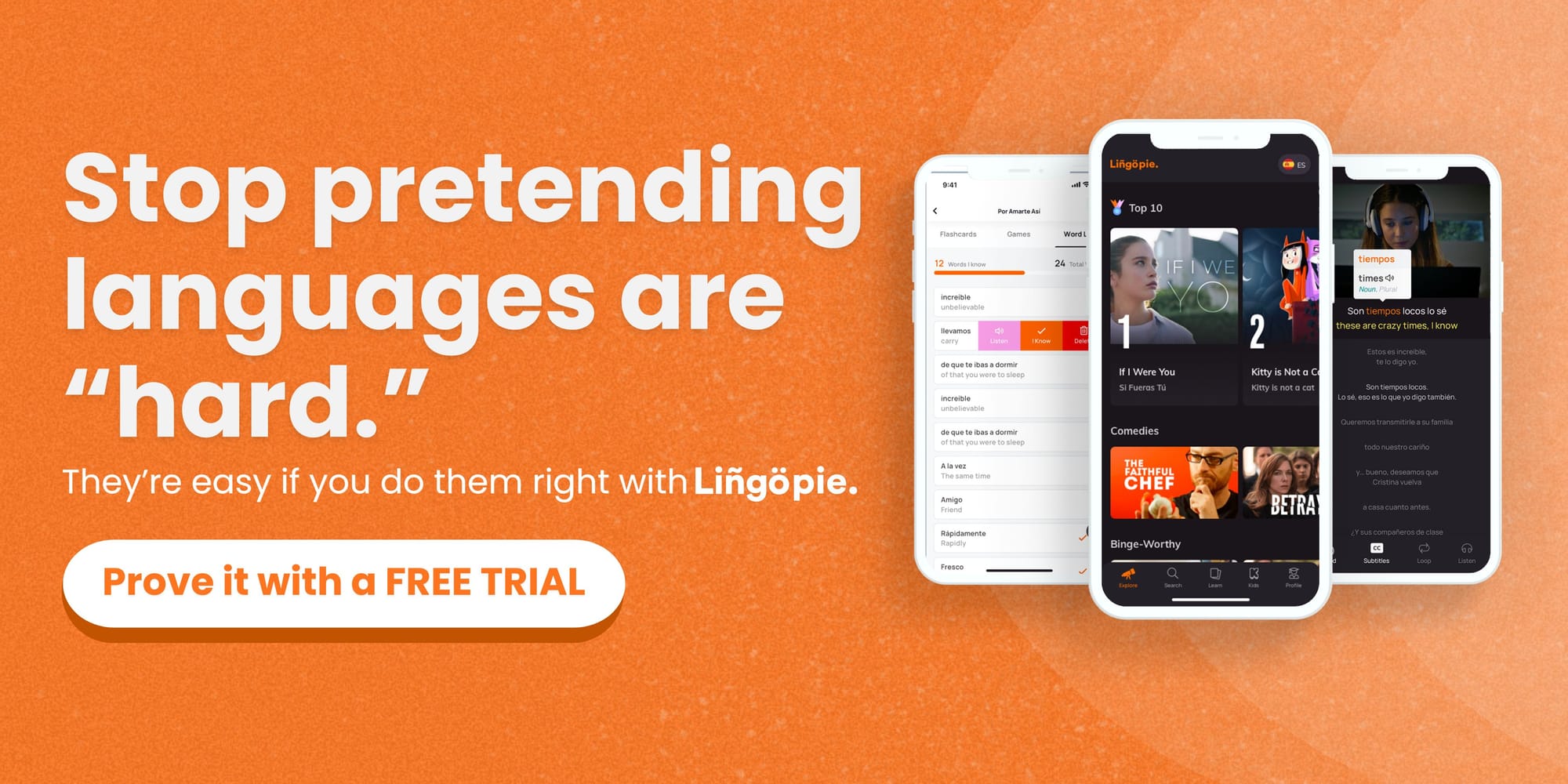
What Is LingQ?
LingQ is a tool for learning 50+ languages through compelling, real-world content. You can read articles, listen to podcasts, or watch videos in your target language, and click on unfamiliar words to see a translation and save them for later review. It was started in 2007 by Steve Kaufmann, a Canadian who speaks more than 20 languages.
Instead of relying on grammar drills or word lists, LingQ encourages learning through exposure to natural language, what’s often called comprehensible input. That means reading and listening to things you mostly understand, even if a few words are new. You can use the platform’s built-in library or import your own content, like YouTube videos, news articles, or Netflix subtitles, and LingQ turns it into a lesson.

One catch? You’re expected to choose content at the right level yourself. When you upload a lesson, LingQ asks you to decide whether it’s beginner, intermediate, or advanced. But if you’re just starting out, it’s hard to tell if that podcast is beginner-friendly or way over your head. In contrast, platforms like Lingopie pre-sort content by level, making it easier to stay on track.
How I Used The LingQ Language Tool
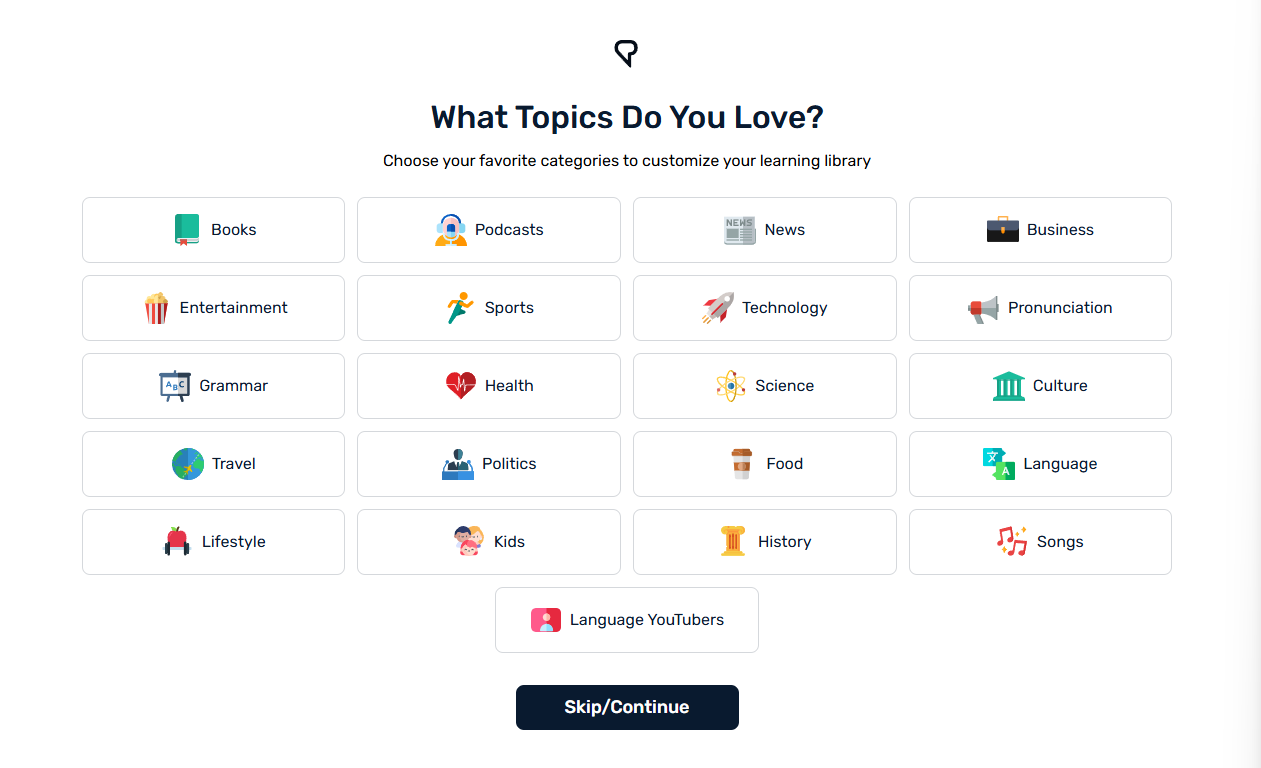
Creating an account was straightforward enough. I signed up, selected how much time I was willing to invest daily, and picked topics that interested me. From there, LingQ introduced me to their content catalog, and I've got to be honest here: it felt pretty overwhelming at first.
There's no real onboarding guide or suggested learning path, so I found myself staring at hundreds of lessons with no clue where to start. I ended up just clicking on one of the available courses and hoping for the best.
Testing the Features and Staying Motivated
During my testing phase, I discovered that LingQ includes several features designed to keep you engaged. The platform has a streak system that tracks your daily activity, and maintaining your streak becomes surprisingly addictive. To keep it going, you need to consume content, review your learned words through their (flashcard) spaced repetition system, and participate in community challenges.
While these gamification elements do help with motivation, I found that the real test was whether the content itself kept me coming back. Unlike more structured platforms like Lingopie that guide your learning journey, LingQ puts the responsibility on you to stay consistent, participate actively, and choose appropriate materials.
Navigating the Content Library
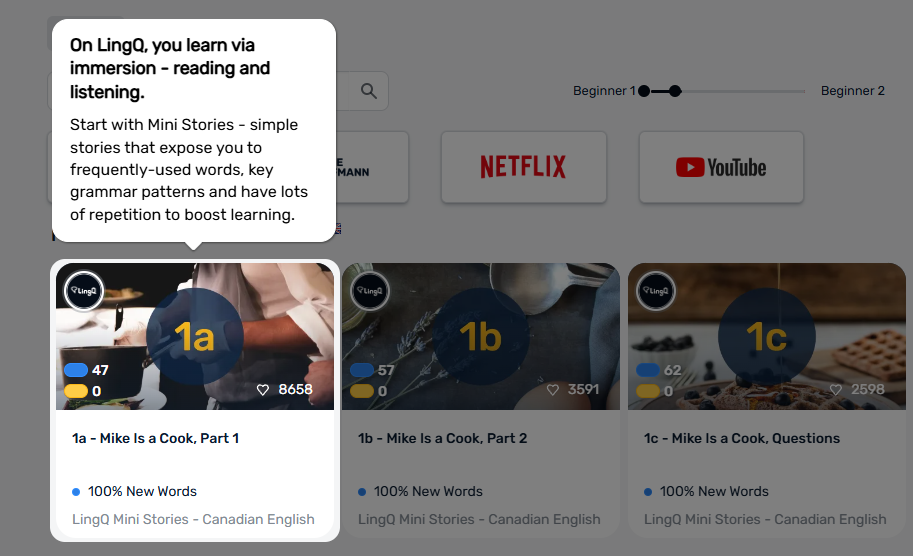
Once I started exploring, I discovered that the content variety depends heavily on which language you're learning. For Japanese, I found materials from NHK World, while Chinese had TED Talks, and German featured content from Deutsche Welle. The key is learning to filter through these resources to find what matches your level and interests.
Not every language gets the same treatment though. Some have robust libraries, while others rely heavily on YouTube imports and user-generated content. Here's something important to know: some languages are still in "incubation" mode. Take Tagalog, for example. LingQ clearly states that "Tagalog is in Incubation on LingQ. LingQ staff do not add nor edit content for this language. All lessons have been community-generated."
Lingq Review: Pros And Cons
Pros Of LingQ
After weeks of testing LingQ across different languages and features, I found several standout elements that make it a compelling choice for language learners. The platform's biggest strength lies in its flexibility and authentic content approach, which sets it apart from more rigid, textbook-style apps. Here's what impressed me most during my hands-on experience.
Useful Content For Every Level
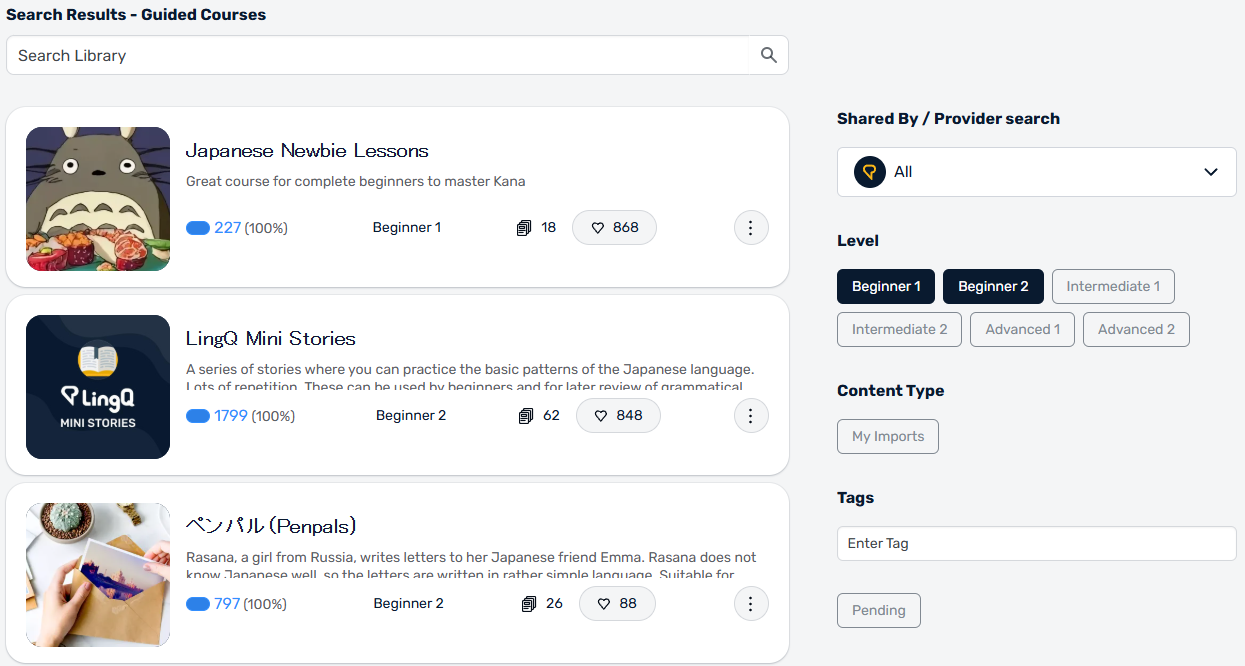
LingQ's content library is genuinely impressive in its scope and organization. The platform categorizes materials into six levels, from Beginner 1 to Advanced 2, covering topics like business, sports, science, and self-help. Some languages feature guided lessons actually recorded by the LingQ team, which provide more structured learning compared to user-generated materials.
You'll also find content sourced from actual news outlets, books, podcasts, songs, and lifestyle material that goes well beyond typical language textbook topics. The YouTube integration through their browser extension opens up even more possibilities. I could even convert cooking tutorials, tech reviews, or travel vlogs into interactive lessons simply by using the extension.
Did you know? LingQ has WhisperAI, which means it can even transcribe audio-only content, creating lessons from recordings or conversations.
Active Community Of Learners

LingQ has an active forum where users discuss everything from grammar questions to study strategies, and I found myself checking it regularly for tips from more experienced learners. The rankings tracker adds a competitive element by showing how you stack up against other users learning the same language, which can be motivating if you're the type who thrives on friendly competition.
The challenge system offers several options to keep you engaged: word challenges, book challenges, and the popular 90-day challenges that create mini-competitions within the community. I participated in a word challenge during my testing and found it pushed me to stay consistent with my daily learning routine.
There's also a writing exchange feature that works similarly to platforms like Tandem. You can submit your writing for corrections from native speakers, and in return, help others by correcting writing in your native language. This creates a reciprocal learning environment that benefits everyone involved.

For those who want to contribute more actively, you can apply to become a LingQ Librarian. As a Librarian, you manage and curate content for the community, importing videos, podcasts, articles, songs, and books that might benefit other learners. It's essentially a volunteer role that helps expand the platform's content library while giving you a sense of contribution to the learning community.
Cons Of LingQ
While LingQ has some strong points, my testing revealed several significant limitations that could be deal-breakers depending on your learning style and current level. These issues became apparent pretty quickly during my hands-on experience, and I think it's important to address them honestly before you invest time or money in the platform.
Not For Beginners
Despite what LingQ's founders claim, this platform really isn't ideal if you're starting from zero. The immersive approach assumes you already have some vocabulary foundation to work with. I found that you need to be at least an upper A2 to lower B1 level to get real value from most content. While LingQ offers "mini stories" for beginners, they're frankly not compelling enough to keep most people motivated through the initial learning phase.
The platform lacks the structured progression and guided exercises that beginners actually need. There's no grammar instruction, no systematic vocabulary building, and no hand-holding through those crucial early stages. You're essentially thrown into authentic content and expected to figure things out, which can be overwhelming and discouraging for true beginners. ou'll likely need to spend time with another resource like Lingopie or a traditional app before LingQ becomes useful.
UI Is Hard To Navigate
Let me be blunt: LingQ's interface feels outdated and cluttered. There are so many elements crammed onto each screen that finding what you need becomes a frustrating treasure hunt. The mobile app is particularly painful to use for extended periods because everything feels squished together. The dictionary and translation features, while functional, are hard on the eyes and not visually appealing.
New users will spend way too much time just figuring out how to navigate the platform. I found myself clicking around randomly during my first few sessions, trying to understand where different features were located. The uploading process for custom content is especially cumbersome, with file size limits and technical requirements that aren't beginner-friendly. If you're not particularly tech-savvy, you'll likely find the whole experience more frustrating than helpful.
Lacks Speaking And Writing-related Features
LingQ is almost entirely focused on reading and listening, with speaking and writing feeling like afterthoughts. While the platform does offer some writing exchange and speaking practice options, they're only available with the Premium Plus subscription, meaning most users miss out entirely.
If you're looking to develop well-rounded language skills, LingQ won't cut it as your primary tool. There's no structured speaking practice, no pronunciation feedback, and limited opportunities for written output. The platform's philosophy is that grammar and production skills will naturally develop through input alone, but in reality, most learners need explicit practice in these areas. You'll need to supplement with other resources or platforms that prioritize speaking and writing development.
LingQ Vs Other Language Learning Platforms
LingQ Vs Lingopie
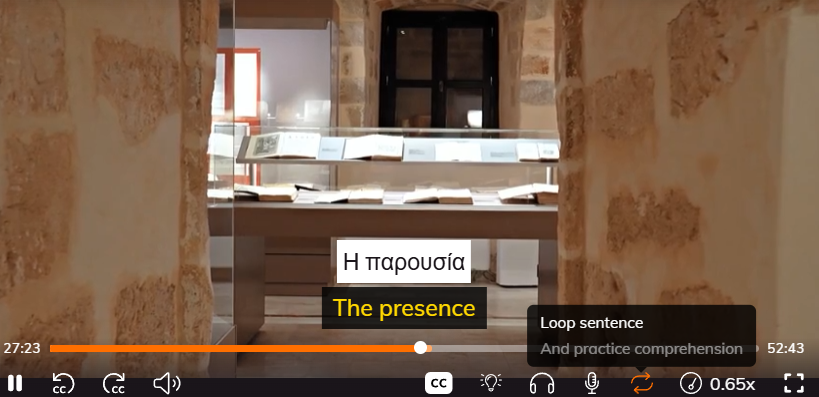
Lingopie is better suited for complete beginners because it removes guesswork and exposes you to TV shows and movies native speakers watch. It offers grammar support, colour-coded subtitles, and a grammar coach, all within content sorted by level. On the other hand, LingQ gives you total freedom to choose or import material, but no help judging if it’s too hard or too easy. That’s fine for advanced learners, but confusing when you’re starting out. Lingopie wins for its structured, beginner-friendly approach.
LingQ Vs Readlang

LingQ handles more content types and includes audio tools like offline playlists and full transcripts. Readlang is faster for reading short texts, but it only supports basic file types, and syncing media like YouTube is fiddly. If you want to just read, Readlang is fine, but for serious practice across skills, LingQ wins for versatility and content depth.
LingQ Vs Migaku

Migaku gives you deep control over your learning—it works with Netflix, YouTube, and other native content, and makes it easy to create flashcards and break down grammar. It’s ideal for advanced learners who want full customisation. But the setup is technical, and switching between tools can feel like work. LingQ is more beginner-friendly but less powerful. Migaku wins for serious self-directed learners.
So, Is LingQ Worth It?
After weeks of testing LingQ across multiple languages and comparing it with other platforms, here's my honest take: LingQ is worth it if you're an intermediate learner who loves reading and doesn't mind a steep learning curve. The platform delivers on its core promise of turning authentic content into interactive lessons, and the ability to import virtually any material gives you unlimited learning opportunities.
However, LingQ isn't the best option available today. The interface feels outdated and cluttered, the beginner experience is poor, and you're essentially paying for a glorified reading tool with limited speaking and writing support. If you want a more complete language learning experience, Lingopie offers superior content curation, better grammar support, and a much more engaging approach through entertainment-based learning.
Discover Real Immersion With Lingopie

If you want to learn a language efficiently and enjoyably, Lingopie is a no-brainer. You’ll be watching shows you love—not fiddling with clunky imports or getting lost in menus. It delivers the immersive experience LingQ aims for, but with polish and ease.
Ready to make real progress without the hassle? Start your free trial with Lingopie today and see how fun, well-designed content can turbocharge your language learning.


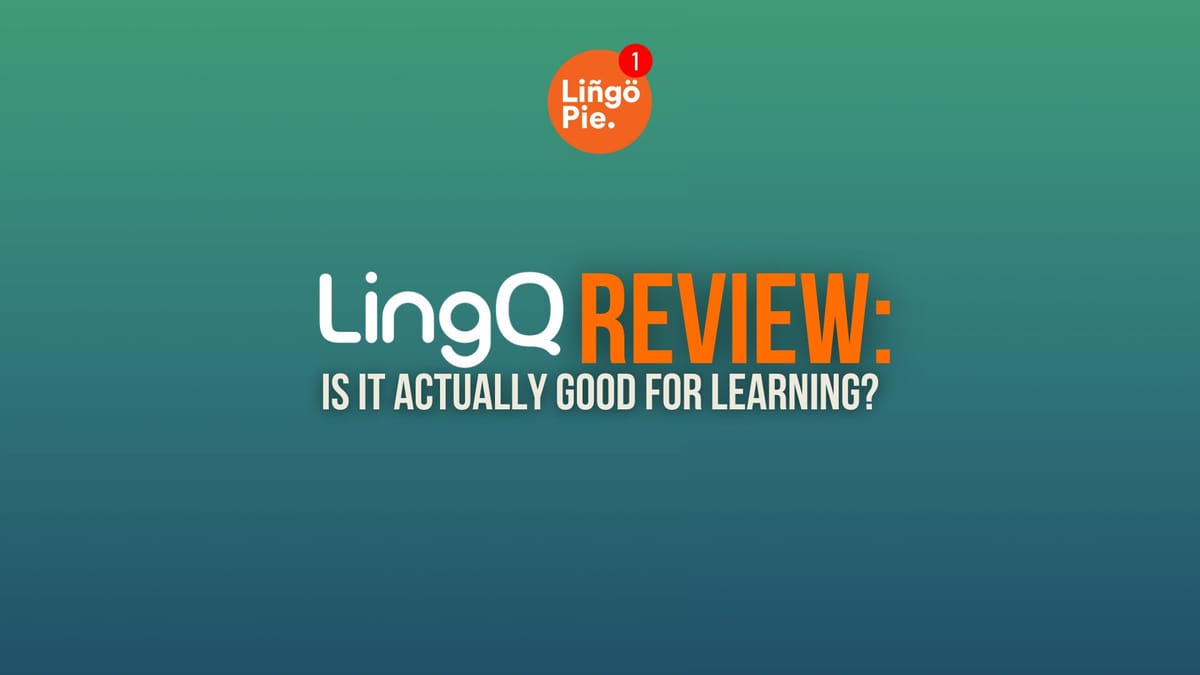

![What Is The Best Way To Learn Greek? Guide + Tips [2026]](/blog/content/images/2025/07/Best-way-to-learn-greek.jpg)
![How To Learn Norwegian As A Beginner: Tips + Guide [2026]](/blog/content/images/size/w1200/2025/07/Learn-norwegian-as-a-beginner.jpg)
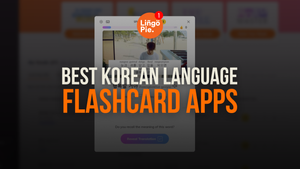


![7 Best Apps To Learn German On Your Own [REVIEWED]](/blog/content/images/size/w300/2026/01/best-apps-to-learn-german-on-your-own.png)